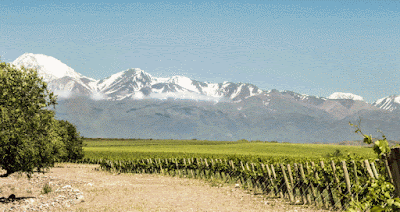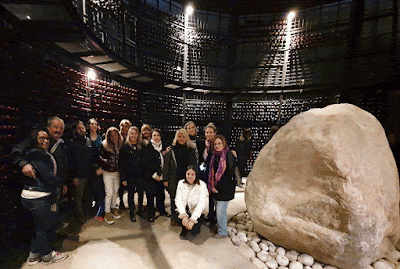Anyway, given this philosophy, it is hardly surprising that carefully prepared vineyard and winery experiences for tourists have come to the fore in recent years. Some of these are described in: Out-of-the-box winery experiences help wineries reach new customers: “From helicopter and horseback to Peloton rides, brand awareness and customer engagement are the goal — not ROI.”. This seems quite unlike the old days, where the main idea was to taste the wines.
In this regard, The World’s Best Vineyards Academy tries, each year, to compile a list of the world’s best vineyard experiences. It works like this:
The Academy comprises nearly 600 leading wine aficionados, sommeliers, and luxury travel correspondents from across the globe. Each has been selected for their expert opinion of the international wine and wine tourism scene. [Each year,] they each vote for 7 vineyards in preferential order. There is no pre-determined checklist of criteria, except that the vineyard must be open to the general public. Each vote is a nomination for a vineyard experience that they deem to be the best in the world. The experience will take in all things connected with the visit — the tour, tasting, ambiance, wine, food, staff, view, value for money, reputation, accessibility. It’s everything that makes a vineyard visit a valuable and rewarding experience for visitors, and makes guests want to return or recommend a visit to their friends.Sounds reasonable, at least to me. Three ranked lists have been released to date: 2019 (a list of 50 vineyards), 2020 (also 50 vineyards), and 2021 (a list of 100 vineyards). Obviously, the thing for us to do in this blog is to compile the three lists, to compare and contrast them. So, I downloaded all three of them, and then created a combined ranked listing, which I report on here.
There are 112 vineyards listed at least once, but only 31 of them appeared in all three lists. This is somewhat less than 30%, which seems to imply that vineyard experiences are not all that repeatable from year to year.
There are 26 vineyards that appeared in two of the lists; and 55 that appeared only once. That is, c.50% of the vineyards had only one good showing. Of them, the unexpected ones are from the 2019 list, where: R. López de Heredia Viña Tondonia (Rioja, Spain) came in 3rd, but was never listed again; and Weingut Tement (Styria, Austria) came 15th, while suffering a similar fate. These are serious falls from grace.
For those vineyards that appeared in two out of the three lists, there were 2 that appeared in the first two lists but not the third (ie. they faded from view through time), and 16 that appeared in the second and third lists but not the first (ie. they rose to prominence). What is odd, though, is that there are also 8 vineyards that appeared in the first and last lists (ie. 2019 & 2021) but not the middle one (2020).
This latter point does make me wonder a bit about the choices by the experts, and how much of a lottery the results might be. After all, it is not like all of these vineyards were borderline in the lists. For example, Bodega Colomé (Salta, Argentina) was listed 25th (2019) and 35th (2021), Viña Santa Rita (Maipo Valley, Chile) was 26th and 28th, Creation Wines (Walker Bay, South Africa) was 45th and 10th, and El Enemigo Wines (Mendoz, Argentina) was 41st and 24th. It is hard to believe that they all went off the boil for a year in the middle.
Anyway, we do have 31 vineyards that were consistent across the three lists. These are listed below, in the order of their average rank across the lists.
Zuccardi Valle de Uco (Mendoza, Argentina) was listed at the top of all three lists (pictured below), while Bodega Garzón (Maldonado, Uruguay) was 2nd, 2nd and 4th (pictured above). So, a vinous trip to South America is clearly called for. In addition, in the top 7 were Montes (Colchagua Valley, Chile), Catena Zapata (Mendoza, Argentina) and Viña VIK (Cachapoal Valley, Chile), thus providing three more reasons to buy that plane ticket. This may explain the recent interest in The new cult vineyards of South America.
Overall, there were 7 (of the 31) vineyards from Chile, 3 from each of Argentina and France, and two from each of Australia, Germany, New Zealand, Spain, Uruguay and the USA. There was one vineyard each for Austria, Greece, Italy, Lebanon, Portugal, and South Africa. Fortunately, that does cover the major wine-producing countries, so, no matter where you are there is an experience nearby.
In one sense, to me this is all beside the point. The best wine experience, it seems to me, is to sit down with the actual winemaker in a relaxed manner for a chat about the wines: all of the rest makes it seem more like Disneyland than a genuine life experience.
In this sense, one of my personal favorite stories involves Llew Knight, of Granite Hills winery in the Macedon region of Australia. This was a long time ago, when both of us were much younger. His parents were looking after the tasting room when I came in. However, when they realized that I was not just a passing tourist, but had specifically targeted them, they called their son in to take over. He was clearly watching the football at the time, but came out anyway, for which I have always been grateful. This sort of simple country friendliness is one of the things I value most.
To bore you with a second story, I once visited Talijancich Wines, of the Swan Valley in Western Australia (back in the 1980s). It had until recently been called Peter’s Wines, and a colleague of mine (named Peter Valder) liked to serve his dinner guests with a label that matched his own name; so he asked me to get a supply for him, since I was in the area. I knew nothing about the place before arriving. However, I still remember having my socks knocked off by their fortified wine, which had more flavors competing for attention than anything else I have ever tasted. They explained to me that it was simply a blend of all of their wines that had ever won an award. This sort of pleasant surprise is my sort of experience.
This list covers the 31 vineyards that made it onto all three lists of the World’s Best Vineyards (2019–2021). They are listed in order of their average rank.
|
Winery Zuccardi Valle de Uco Bodega Garzón Montes Bodegas de los Herederos del Marqués de Riscal Catena Zapata Quinta do Crasto Viña VIK Antinori nel Chianti Classico (Marchesi Antinori) Château Smith Haut Lafitte Rippon Craggy Range Domäne Wachau Château Margaux Clos Apalta Robert Mondavi Winery Schloss Johannisberg Weingut Dr Loosen Penfolds Magill Estate Delaire Graff Estate Opus One Winery d’Arenberg Familia Torres — Pacs del Penedès Bodegas RE Château Mouton Rothschild Viña Casas del Bosque Viu Manent Bodegas Salentein Bodega Bouza Château Héritage Viña Errázuriz Domaine Sigalas |
Region Mendoza Maldonado Colchagua Valley Rioja Mendoza Douro Valley Cachapoal Valley Tuscany Bordeaux Central Otago Hawke’s Bay Wachau Bordeaux Colchagua Valley Napa Valley Rheingau Mosel South Australia Stellenbosch Napa Valley South Australia Catalonia Casablanca Valley Bordeaux Casablanca Valley Colchagua Valley Mendoza Montevideo Bekaa Valley Aconcagua Valley Santorini |
Country Argentina Uruguay Chile Spain Argentina Portugal Chile Italy France New Zealand New Zealand Austria France Chile United States Germany Germany Australia South Africa United States Australia Spain Chile France Chile Chile Argentina Uruguay Lebanon Chile Greece |




Speaking as an American who resides in California, and works in the wine industry, I find it too predictable to have two -- and only these two -- wineries nominated:
ReplyDeleteOpus One Winery
Robert Mondavi Winery (a co-founder of Opus One)
I demur.
Those wineries represent two of last century's cutting edge efforts -- in the vineyard, and in the experience tasting the bottle.
More brand name recognition than earned kudos.
The domestic wine world has moved on, thankfully.
The cutting edge lies elsewhere . . .
As is often the case, I assume "vineyard" is being mistakenly used to mean "winery"? What is said when it actually is just the place with vines?
ReplyDeleteMiquel:
DeleteAccessing the Academy's website and navigating to the voting procedure section . . .
https://www.worldsbestvineyards.com/voting/the-voting-system
. . . I proffer this (excerpted) text:
"Academy members must have visited the vineyards they vote for since 1 January 2016 – and are asked to confirm this when voting"
"Academy members can only vote for vineyards open to the public (not including any temporary closures due to Covid-19 restrictions)."
Vineyard being a physical plot of land.
Regarding nominees Château Mouton Rothschild and Château Margaux: are they really "open to the public" for a visit and (one assumes) a tasting?
~~ Bob
An addendum:
DeleteI wonder how many Academy voters have actually visited Château Mouton Rothschild and Château Margaux since 2016?
And I wonder "how" -- exactly -- voters "confirm[ed]" their visits?
(It's not as if one's passport gets "stamped" by those châteaux.)
Would the organizers of this survey who are reading this blog post like to step forward and explain themselves?
~~ Bob
Vina Vik in Italy - might be an expensive travel mistake !
ReplyDeleteWe spent 21 days in Argentina pre covid 2019..mostly in Mendoza..I question these ratings. While beautiful and relatively inexpensive by most standards of international travel to wine regions..it was not warm and fuzzy as you eould ecpect. You had to make a reservation..go thru security..do their guided tour..and listen to the heavy sales pitches...not as relaxing as I am use to...We own a small winery in Arizona. Most of Argentina is a poor country..walls and the security issues. I suggest one go north to Villa Nueva...or south of Mendoza..much friendlier..boutique wineries.
ReplyDeleteEnjoy!!
Without explaining specifically and in great detail why a particular Vineyard/Winery deserves to be on such an exclusive list, the results have virtually no meaning. Why should it be there? Hospitality to some people means offering more than just a stand-up wine tasting -- like perhaps food? Some would suggest that very specific details be provided about the vineyards (soils, rootstocks) and the wines and their production. As a wine columnist for nearly 50 years, I get the full treatment -- and if get fluff answers instead, I pursue explication necessary to write a story. I doubt very seriously whether the panelists who vote on this are being particularly critical before they cast their votes. I can think of approximately 200 California wineries that I would place ahead of Robert Mondavi and Opus One, another 25 in Australia and another 15 or so in New Zealand. And I haven't even mentioned Canada, Michigan, New York and Colorado!
ReplyDeleteBut I would agree that Zuccardi should be on such a list!